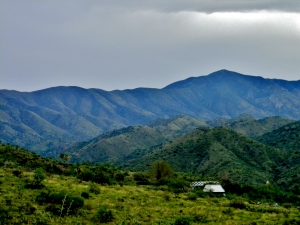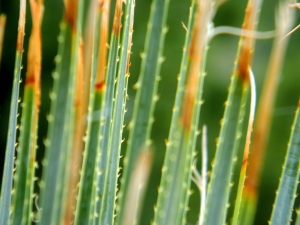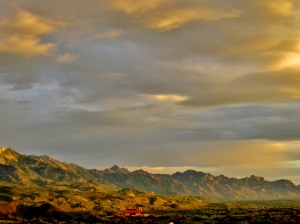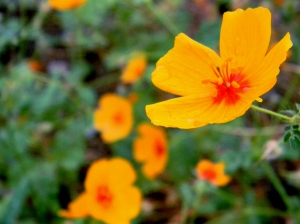I will be starting my third year of graduate school in a couple of weeks. Time sure has flown by, but at times, it has seemed like an eternity. Like that moment when you cry your heart out and things don’t change. Or when you lay in bed curled up in a ball, mentally unable to get up and carry on with your life. Approximately a year ago, I had the most terrible breakdown I’ve ever had in my entire life. Even though today I can say I’ve survived the worst thing that’s happened to me, I’m still afraid that it will happen again. And it’s not fun.
A year ago, I was completely depleted of any reserves of self-confidence that a human being can have. I didn’t think very highly of myself, I didn’t know what I was doing with my life, and I didn’t know what life wanted out of me. I wasn’t sure that I could get through it all alive.
Part of the issue was personal struggles; the other half was probably low self-esteem and not knowing in which direction to go. The personal struggle is not something I talk about when I meet people. In fact, very few people know about it, not because it’s something you don’t talk about, but because I didn’t want people to see me with sympathy or pity. I wanted people to know me for my work and scientific performance, not for my personal issues. I wanted to keep my personal life out of this, but it was affecting every other aspect of my life.
My dad was diagnosed with prostate when I was a sophomore in college. He was in stage 9 of the Gleason scale, so the tumor had to be removed immediately, followed by aggressive rounds of radiation. Now, I was living at home at the time, so it wasn’t like I could numb myself for a couple of days and pretend that everything was normal for a while. It was something that I had to deal with emotionally and socially every single day. I had to be strong for my family, because my parents were not dealing with things in the best way. So I had to remain calm and collected for the sake of keeping my family’s sanity.
The prostate cancer went away. We were all over the moon that my dad was doing better, although the side effects were pretty intense. However, we were able to have a positive outlook about life.
Two years later, while I was starting my last semester of college, things took a very unexpected twist. My grandmother, the person who raised me into the woman I am today died on the day I turned 22. My dad, who had been in remission for a while, started feeling ill again. His red blood cell count was very low; he was anemic for a couple of months and doctors could not find the reason. Now, when you’re told you need to have to a biopsy, you know things are up to no good. Not when you need a bone marrow biopsy. And that year just felt like it was raining crap from the sky.
My dad is still alive, although this last couple of years have been nothing but misery. He’s been through numerous rounds of chemotherapy and countless numbers of pills, supplements, injections, blood transplants, you name it. It is when you question everything and every form of spiritual power. It is when you ask yourself if life is worth living when you’re not really living. It is when science and everything related to reason doesn’t work. It is when all you do is suffer, sometimes quietly, and are always expecting the worse. Cancer not only affects your physical health; it damages your relationships, the people you love, and the things you do that make life seem normal.
After seeing my family go through so much pain, I needed to do something. What I needed to do, I wasn’t quite sure about. I couldn’t just go away to grad school while my family was in crisis, I couldn’t, but I did. And boy, was I miserable during my first year. I was probably the most miserable human being on earth. I cried nearly every week, and I was best friends with panic.
I didn’t move too far away from home, so I was still able to visit every once in a while. But sometimes those visits would make things worse. As a child, you never expect to see your parents in such poor health. Your dad, the one who held your hand and took you to school the first day, the one who never cries and always stays strong, was not the dad I remembered as a child. I was now in front of somebody who had been stripped away not only of his health, but also of his human dignity. He was made vulnerable to the core, to the point where questions are needless and you can see and feel everything. You can see pain in the eyes of people, feel it in a hug, and smell it in the air of a poorly ventilated room.
I am not one of those people that can separate their emotions from their work, so as a result, I was doing very poorly, academically and socially. My self-esteem was on the ground. But even though I thought I would die of the pain, I’m here writing about it, And somehow telling people about it, made the pain a little more bearable. I wanted to keep it all to myself and deal with it in silence, but that only made it worse. The pain that you feel inside burns like a sharp knife on your flesh, and leaves you out of tears to cry and air to breathe; you feel helpless and see no light, no hope, no tomorrow. I felt like I was drowning in an endless ocean or falling into a bottomless pit. I sat in a corner of my room, in fetal position and I can clearly remember wanting to disappear. I was a failure as a student, as a human being, as a daughter. I had failed in every single aspect of life and I wanted to vanish. I wanted to die.
I grew up in an environment where asking for help is seen as a sign of weakness. Where you do everything you can yourself, and only if you can’t, you ask for help. So the last thing I wanted to do was to tell people that I couldn’t take this, that I was a failure, that I didn’t think I deserved to live. But doing exactly the thing I was most afraid of was what saved me. I was a zombie at work for about a week, just going through the motions and pretending that I could handle it all. Because if there was anything I was good at, I was good at trying to hide my emotions. Until the glass was overflowing and about to spill at the rim.
I survived. I am a better and stronger person. I’m getting better at asking for help and I’m trying to be less hard on myself. Now, I’m not going to say that the breakdown I had a year ago won’t happen again, but I’m doing things to avoid it. In a way, it was an awakening. It made me more aware of pain, and of the people suffering around me. I am not alone. Life is not reduced to accomplishments, where the more you do or have, the better you are. I will be thankful for the little things, for the good and the bad, because the good makes you happy and the bad makes you stronger. I will not push things anymore; I will continue to work hard, but I will let things fall into place. There are things in life that you can’t control, and it’s not your job to try to make everything better, when you yourself are not whole. I can’t change the world and solve all the problems, I can’t cure cancer and win a Nobel prize, I can’t change people’s minds to make them think the way I want. I can only love myself for who I am and be the best I can be. That is my contribution to this world.
 You’ve been plugging away at your PhD for a while now, maybe a year, perhaps a couple of years. But you don’t seem to be making that…
You’ve been plugging away at your PhD for a while now, maybe a year, perhaps a couple of years. But you don’t seem to be making that…










